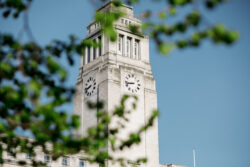Scenarios Forum 2025: Making climate conferences better for the planet

Academic conferences can act as a vehicle to advance climate action — but they also come at an environmental cost.
Many participants travelling to a large conference internationally, for example, can emit as much carbon dioxide as one city does in a week. Yet, conferences are important for creating new knowledge, policy, and collaboration, which is made possible by bringing together a global community of academics and professionals. Conferences on climate change can create much-needed momentum for interventions on the climate crisis
This paradox has come into sharp relief at the University of Leeds this year, as the University and the Priestley Centre for Climate Futures are hosting the Scenarios Forum 2025. The Scenarios Forum is an influential, multi-disciplinary conference on the use of scenarios in addressing global challenges of our time. Among the foremost of these challenges is, of course, climate change.
 The Scenarios Forum as a Living Lab
The Scenarios Forum as a Living Lab
Recognising both the sustainability progress and sustainability challenges associated with international conferences, we have established a Living Lab for the Scenarios Forum 2025. A ‘Living Lab’ uses real-life scenarios as a test bed for cross-institutional research. This Living Lab at the University of Leeds is dedicated to trialling sustainability solutions in the running of the Scenarios Forum 2025. The project examines the range of environmental and ethical challenges associated with large academic events, which will be explored in a series of blogs in the run up to the Scenarios Forum 2025.
Aligning with the focuses of the Living Lab, these blogs will focus on:
- Travel: As the largest source of carbon emissions associated with academic conferencing, the Living Lab team are exploring how to increase delegates’ use of train travel to the event, the use of bikes within Leeds, and how to facilitate effective online participation.
- Accommodation and suppliers: We are embedding an approach to assess hotel and supplier sustainability policies and developing a framework to work with these businesses on their sustainability journey. Read our blog focused on accommodation.
- Catering: Building on the University of Leeds catering team’s existing work to increase the sustainability of the University of Leeds’ menus, the Living Lab has developed a set of environmental and social sustainability principles for the food served at the Scenarios Forum 2025. Read our blog focused on catering.
- Accessibility: As part of our Corporate Social Responsibility and our sustainability ambitions for the Scenarios Forum, we are working to ensure conference is as accessible and inclusive as far as reasonably practicable.
Through the Living Lab, these sustainability initiatives are being developed hand-in-hand with conference delegates themselves. The Living Lab is, for example, trialling a ‘Sustainable Delegate Guide’, compiling guidance for delegates new to Leeds on how to minimise their personal environmental impact, and maximise the social benefit, of their visit.
Yet the Living Lab is a reflective exercise as much as an innovative one. This self-reflection is built-in through multiple channels, including surveys with conference delegates before, during, and after the Scenarios Forum 2025. Conducted online and in-person, these surveys recognise that the Living Lab has much to learn from conference delegates – exploring their perspectives on accessibility, travel, catering, accommodation, and missed opportunities for improving the social and environmental ethics of the conference.

Far from a one-off data collection exercise, this Living Lab is intended to create a portfolio of learning on sustainability in academic conferencing which will continue to be built-upon by future events.
Many of the sustainability and ethical challenges associated with the Scenarios Forum 2025 are structural to the higher education sector: high levels of international travel, financial inaccessibility for delegates from the Global South, and reducing the environmental impact of catering. The Living Lab is intended to develop knowledge and momentum towards addressing these challenges. Though there is no quick-fix to any of these challenges, the Living Lab provides a test-bed for trialling sustainability and ethics initiatives within the Scenarios Forum 2025.
Over the coming weeks, this series of blogs will unpack the Living Lab’s work to advance solutions to these sustainability and ethical challenges. Above all, the Living Lab is a community for research, trialling, communication, and mutual learning, to enable academic conferences to advance climate knowledge without creating more climatic harms.
Register for the Forum on Scenarios for Climate and Societal Futures, held at the University of Leeds from 16 - 18 July. For more information about the conference and registration, visit the Scenarios Forum website.
Further Information
Blog written by Catriona Flesher, a PhD student studying Loss and Damage from climate change, and member of the Scenarios Forum organisational committee.
Featured image: Adobe stock
